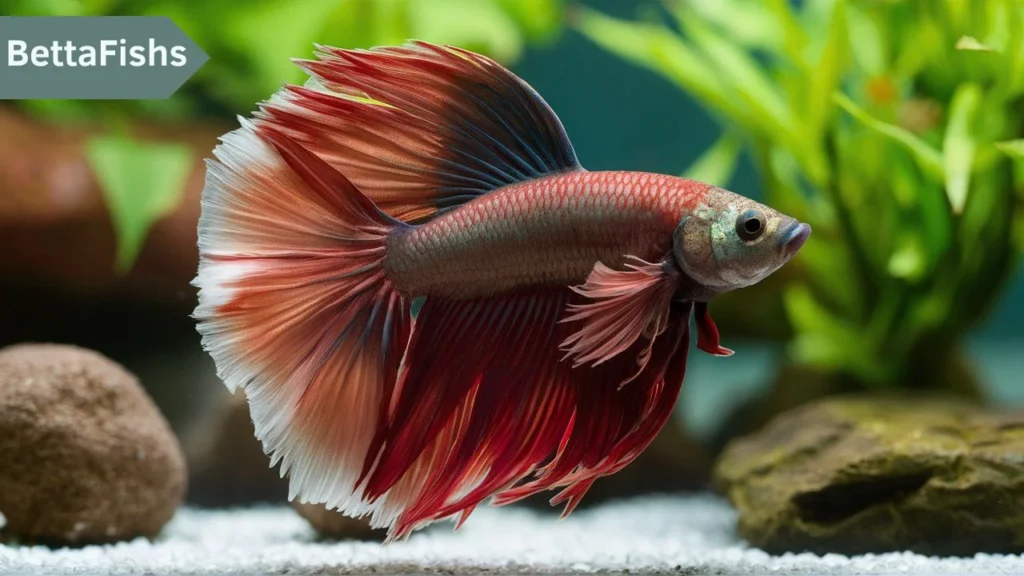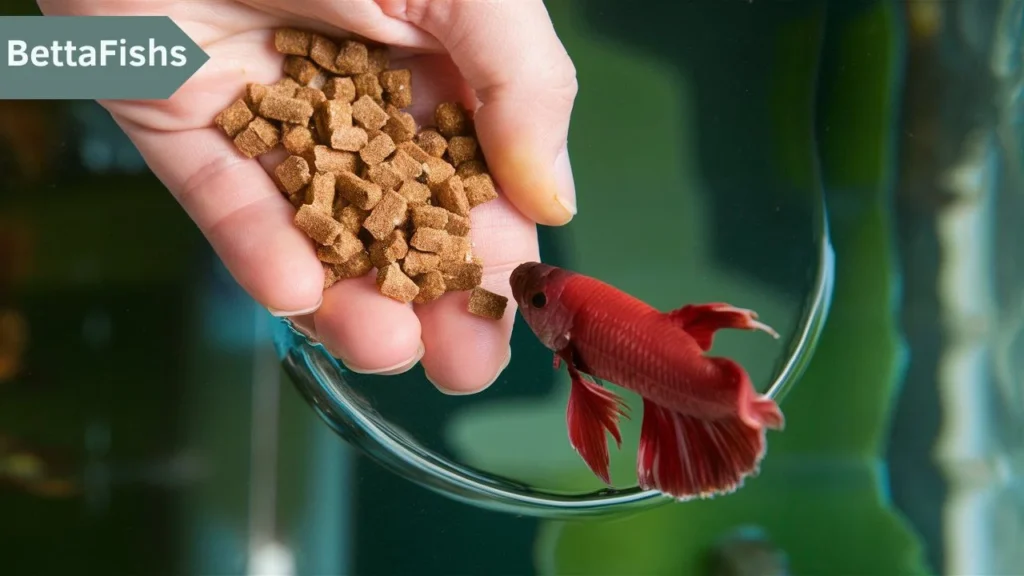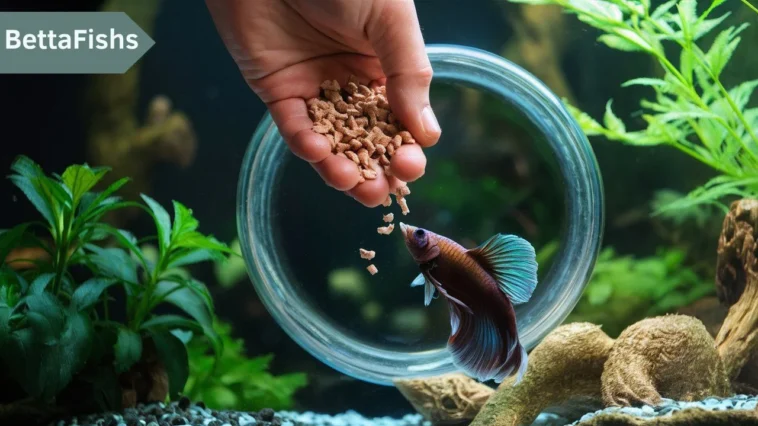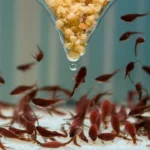Betta fish are not just any ordinary pets; they are little aquatic warriors with a diet that requires attention and care. Understanding how often to feed your Betta fish is more than just tossing a few pellets into the water each day.
It’s about ensuring they get the right nutrients at the right time, in the right amount. Proper feeding practices can significantly impact their health, lifespan, and overall well-being. So, how often do Betta fish eat? Let’s dive into this topic to keep your Betta happy and thriving.
Natural Diet of Betta Fish
Betta Fish in the Wild
In their natural habitat, Betta fish are found in the shallow waters of Southeast Asia, such as rice paddies, slow-moving streams, and swamps. These environments are teeming with insects and larvae, making Betta fish natural-born hunters. Unlike their life in a tank, wild Bettas don’t have a regular feeding schedule. They eat whenever they come across food, which can sometimes be scarce, leading them to adapt to periods of fasting.
Carnivorous Nature of Betta Fish
Betta fish are primarily carnivorous, which means their diet in the wild consists mainly of insects, insect larvae, and small crustaceans. Their sharp teeth and aggressive nature make them excellent predators. This carnivorous tendency is crucial to remember when deciding what to feed them in captivity. A diet high in protein is essential for their health, coloring, and energy levels.
Types of Food for Betta Fish
Commercial Betta Fish Pellets
One of the most convenient and commonly used food types for Betta fish is commercial pellets. These are specifically formulated to meet the dietary needs of Bettas, usually containing a high protein content. When choosing pellets, it’s important to select a high-quality brand that lists meat or fish as the first ingredient.
Frozen and Live Food Options
Frozen and live foods are excellent choices for replicating the natural diet of a Betta fish. Options include bloodworms, brine shrimp, and daphnia. These foods are rich in protein and other essential nutrients, making them ideal for Betta fish. Live food, in particular, can stimulate the hunting instincts of Bettas, providing both nutritional and behavioral benefits.
Freeze-Dried Foods
Freeze-dried foods, such as bloodworms or shrimp, are another option for feeding Betta fish. They are convenient and easy to store but need to be rehydrated before feeding. While not as nutrient-rich as live or frozen foods, they can still be a valuable part of a balanced diet.
Homemade Betta Fish Food
For those who prefer a more hands-on approach, homemade Betta fish food can be an option. Recipes often include a mix of fish, shrimp, and vegetables, blended and frozen into small portions. This option allows for full control over the ingredients and nutritional content.
How Much Should You Feed?
Avoiding Overfeeding
One of the most frequent blunders made by Betta owners is overfeeding. It can lead to obesity, bloating, and even swim bladder disease. To avoid this, feed your Betta only what they can consume within 2-3 minutes.
Signs of Overfeeding
Signs of overfeeding include a bloated stomach, lethargy, and uneaten food settling at the bottom of the tank. If you notice these signs, it’s important to adjust the feeding quantity and possibly skip a meal to let your Betta’s digestive system recover.
Proper Portion Sizes
A good rule of thumb is to feed your Betta an amount of food equivalent to the size of its eye. This small portion size ensures that they get enough to eat without the risk of overfeeding.

Special Feeding Considerations
Feeding Betta Fish Fry
Betta fry (baby Bettas) requires more frequent feedings, often up to three or four times a day. They need tiny, high-protein foods like infusoria or newly hatched brine shrimp to grow properly.
Feeding Sick Betta Fish
If your Betta is sick, their appetite may decrease. Offer small, easily digestible meals and consider foods like garlic-infused pellets, which can boost their immune system.
Diet for Older Betta Fish
Older Betta fish may have slower metabolisms and may require smaller, more frequent meals. Adjust their diet accordingly to prevent weight gain and digestive issues.
Seasonal Adjustments in Feeding
Feeding During Winter
During winter, Betta fish metabolism may slow down due to lower water temperatures. In such cases, feeding them less frequently is advisable to avoid overfeeding.
Changes in Appetite During Warmer Months
In warmer months, your Betta’s metabolism may increase, leading to a bigger appetite. Adjust their feeding schedule accordingly, but still be cautious of overfeeding.
Betta Fish Behavior Related to Feeding
Recognizing Hunger Cues
Betta fish often display certain behaviors when they are hungry, such as swimming near the surface or around the area where they are usually fed. Recognizing these cues can help you determine if they need more food or if their feeding schedule is adequate.
Behavior Changes Due to Overfeeding or Underfeeding
Overfeeding can make your Betta sluggish, while underfeeding may cause them to become overly aggressive or hyperactive. Monitoring their behavior can give you clues about their dietary needs.
Interpreting Food Refusal
If your Betta refuses food, it could be a sign of illness or stress. It’s important to investigate the cause, whether it’s poor water quality, unsuitable food, or underlying health issues.

Importance of Water Quality in Feeding
How Feeding Affects Water Quality
Uneaten food can quickly deteriorate water quality by breaking it down into harmful substances like ammonia. This can stress your Betta and lead to health issues. Regular cleaning and monitoring of water parameters are essential.
Managing Waste from Uneaten Food
To manage waste, remove any uneaten food after feeding. This prevents it from decaying and contributing to poor water quality.
Role of Filtration in Maintaining Water Quality
A good filtration system can help manage waste and keep water quality stable, which is particularly important when feeding Betta fish. It reduces the frequency of water changes and keeps the environment healthy.
Supplementing Your Betta Fish’s Diet
Vitamins and Minerals
While a high-quality diet usually provides all the necessary nutrients, some Betta owners choose to supplement their fish’s diet with vitamins or minerals. These can be particularly useful if your Betta is recovering from illness.
Using Supplements Safely
If you decide to use supplements, follow the instructions carefully to avoid overdosing, which can be harmful. It’s best to consult with a vet or a fish expert before introducing any supplements.
Treats and Their Role in Diet
Treats can be a fun addition to your Betta’s diet, but they should only be given occasionally. Treats like freeze-dried bloodworms are high in protein but should not replace their regular meals.
Signs of a Healthy Diet in Betta Fish
Physical Indicators of Health
A Betta fish with a healthy diet will display vibrant colors, clear eyes, and smooth, flowing fins. They should also be active and responsive to their environment.
Behavior as a Reflection of Diet
Healthy Betta fish are usually curious, active, and have a good appetite. A sudden change in behavior can indicate dietary issues or health problems.
Longevity and Diet Correlation
A well-fed Betta with a balanced diet can live for several years. Proper nutrition is directly linked to their longevity and overall health.

Conclusion
Feeding your Betta fish the right way involves more than just dropping some food in the tank. It requires an understanding of their natural diet, careful portion control, and attention to their behavior and health. By following the guidelines laid out in this article, you can ensure that your Betta fish lives a long, healthy, and happy life. Regular monitoring and adjustments to their diet will help you meet their needs as they grow and change.
FAQs
How do I know if I’m overfeeding my Betta fish?
Overfeeding signs include bloating, lethargy, and uneaten food in the tank. Reduce portions if you notice these symptoms.
Can Betta fish go a day without food?
Yes, Betta fish can go a day without food and occasional fasting can be beneficial for their digestive health.
Is it okay to feed my Betta only pellets?
While pellets can be the main diet, it’s best to supplement with live, frozen, or freeze-dried foods for a more balanced diet.
How do I train my Betta fish to eat from my hand?
To hand-feed your Betta, start by holding food near the surface and gradually bring it closer until they eat directly from your hand.
What should I do if my Betta fish refuses to eat?
If your Betta refuses to eat, check water quality, offer different types of food, and observe for signs of illness. Consulting with a vet may also be necessary.





6 Comments
Leave a Reply6 Pings & Trackbacks
Pingback:What Do Betta Fish Eat in the Wild?
Pingback:Can Betta fish eat tropical flakes?
Pingback:Can Betta fish eat brine shrimp?
Pingback:Can a Snail eat a Betta fish?
Pingback:Does Betta fish eat shrimp?
Pingback:Unique Male Betta Fish Names